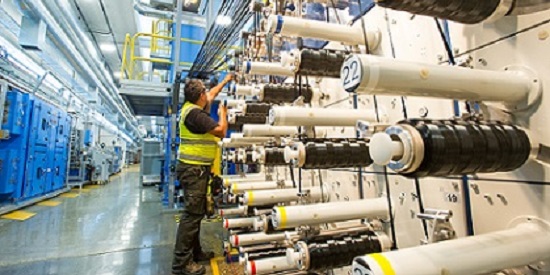Deakin and LeMond Composites join forces on carbon fibre
Media releaseDeakin University has paved the way to dramatically cut the cost of carbon fibre manufacturing, joining forces with LeMond Composites in a $US44 million deal to revolutionise its use across the world.
The partnership, signed today by Mr Greg LeMond – a three-time Tour de France winner and the founder and CEO of LeMond Composites - and Deakin Vice-Chancellor Professor Jane den Hollander AO at the University’s Waurn Ponds Campus, allows LeMond Composites to license technology developed by Deakin’s world-leading carbon fibre research centre, Carbon Nexus.
Mr LeMond’s company, LeMond Composites, will also consider the development of a carbon fibre manufacturing plant in Geelong, which would invest more than $30 million in construction and equipment, and create dozens of jobs for Geelong manufacturers to take the carbon fibre of the future to the global market.
The specialised carbon fibre production machinery for the plant will be manufactured by Furnace Engineering in Clayton, Victoria.
Professor den Hollander said the new technology, developed by Carbon Nexus PhD Student Maxime Maghe and Carbon Nexus General Manager Steve Atkiss, was a game-changer for the future of manufacturing.
“We know carbon fibre has been in use in aircraft, high-end cars and bikes, among other applications for a long time now, but it remains a niche product that costs a significant amount to produce,” Professor den Hollander said.
“This new technology could revolutionise the advanced manufacturing sector locally, across Australia and around the globe, because it will make carbon fibre more affordable to produce, which will make it more accessible for consumers.
“This is a huge global success story and it was incubated right here at Waurn Ponds, by one of our very own future leaders – a PhD student working under the guidance of our gifted leadership in carbon fibre research.
“And carbon fibre could ultimately be made right here in Geelong, at our Waurn Ponds Campus, where over a decade of government, industry and our own investment has created a map for manufacturing of the future. The opportunities are clear.”
Mr LeMond in 1986 became the first cyclist to win the Tour de France on a carbon fibre bike. He has been a household name among cyclists for three decades, selling carbon fibre bikes under his own brand around the globe, before last year setting up LeMond Composites to realise his vision of affordable carbon fibre cycles for everyday riders.
Mr LeMond said the ability to scale low-cost carbon fibre production had been the biggest hurdle to bring the material to the masses.
“Deakin University’s manufacturing process will make it possible to localise manufacturing and make carbon fibre technology more accessible to a wider range of industries like transportation, renewable energy and infrastructure or any industry that benefits from using lighter, stronger, safer materials,” Mr LeMond said.
Professor den Hollander said the scope for future growth of Deakin and LeMond’s partnership had potential to help transform a new future for Geelong.
“We all know that Geelong’s reliance on manufacturing has changed and the future will be driven by high-value advanced manufacturing,” Professor den Hollander said.
“Deakin is passionate about supporting the communities we serve, working collaboratively with industry and relevant business and governments to drive forward solutions to the challenges our region is confronted with, which is why we have been heavily involved in supporting Geelong’s transition through projects like Carbon Nexus.
“Our University has played a key role in finding these solutions, leveraging off our world-class research, infrastructure, and industry and government partnerships. I am delighted to now work with Greg LeMond and his team to help find a way that helps Geelong lead the world.
“Just three months ago, Deakin joined with the City of Greater Geelong and G21 to launch Geelong Economic Futures – a blueprint for a number of projects that included scope for development to help lead this city’s future and carbon fibre development was a key project highlighted, so it is pleasing to see a key in this vision come to fruition.”
The award-winning Carbon Nexus centre was established in 2014 as a globally-unique, cutting-edge research facility to conduct basic and industrial-scale research into carbon fibre production methods and composite manufacturing techniques.
Share this story

